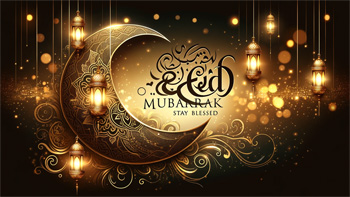 Eid al-Fitr in India
Eid al-Fitr in India


Eid al-Fitr, commonly known as Eid, is one of the most celebrated festivals in India, marking the end of Ramadan, the Islamic holy month of fasting. This festival, rich in cultural and religious significance, is awaited with great anticipation by the Muslim community in India and is observed with joy and fervor. Eid al-Fitr not only symbolizes the conclusion of a month-long period of fasting and spiritual reflection but also embodies the values of brotherhood, charity, and gratitude. In the diverse tapestry of Indian festivals, Eid al-Fitr holds a special place, reflecting the country's composite culture and tradition of communal harmony.
The Significance of Eid al-Fitr
Eid al-Fitr, which translates to 'the festival of breaking the fast', is celebrated on the first day of Shawwal, the month following Ramadan in the Islamic lunar calendar. It is a day of great rejoicing for Muslims, as it marks the completion of a period of intense spiritual rejuvenation and fasting from dawn to dusk. The festival is not only a celebration of the end of fasting but also a thanksgiving to Allah for the strength and endurance granted throughout Ramadan. It's a time to reflect on the lessons of discipline, self-control, and empathy for the less fortunate, learned during the holy month.
Eid Celebrations in India
The celebrations of Eid in India are a splendid display of the country's cultural diversity and religious unity. The day begins with a special communal prayer, known as the Eid Salah, performed in large open areas or mosques. Dressed in new and often traditionally ornate clothes, Muslims gather in large numbers to offer prayers and listen to the Eid sermon. The atmosphere is one of communal joy and solidarity, with people embracing each other and exchanging greetings of "Eid Mubarak" (Blessed Eid).
Traditions and Customs
One of the core traditions of Eid al-Fitr is the giving of Zakat al-Fitr, a form of charity given to the poor before the Eid prayers. This act ensures that those less fortunate can also partake in the celebrations. Post-prayer, the day is spent visiting friends and family, sharing meals, and exchanging gifts. Special dishes like biryani, kebabs, and sweets like seviyan (vermicelli) and sheer khurma (a sweet milk and dates dish) are prepared in homes, adding to the festivity's flavor.
Cultural Impact and Celebrations Across Regions
In India, Eid celebrations vary across regions, each adding its unique flavor to the festivities. In the northern parts, especially in Delhi and Lucknow, Eid is synonymous with lavish feasts and the famous 'Eid Bazaars'. The southern states, including Hyderabad and Kerala, are known for their distinctive culinary traditions during Eid. In the western states like Maharashtra and Gujarat, Eid is marked by vibrant street celebrations and community feasting. These regional variations reflect the rich cultural tapestry of India and its ethos of unity in diversity.
Interfaith Harmony During Eid
Eid al-Fitr in India also exemplifies the country's spirit of interfaith harmony. People from different religious backgrounds participate in Eid festivities, visiting their Muslim friends and neighbors, and partaking in the celebrations. This mutual respect and participation in each other’s festivals reinforce the secular fabric of Indian society and promote a sense of shared belonging and communal harmony.
Modern Day Observance of Eid
In modern times, while traditional practices continue, new ways of celebrating Eid have emerged, especially in urban areas. The use of digital technology for sending Eid greetings and the popularity of online shopping for Eid purchases reflect contemporary influences. Despite these modern adaptations, the essence of Eid - its emphasis on charity, gratitude, and community bonding - remains unchanged, making it a festival that transcends temporal changes and continues to bind the community in a shared ethos of joy and brotherhood.
Eid al-Fitr in India is not just a religious observance; it is a celebration that transcends religious boundaries, fostering a spirit of unity and brotherhood. As families gather, prayers are offered, and feasts are shared, Eid strengthens communal ties, reaffirms the values of charity and empathy, and reinforces the cultural and social harmony that characterizes the diverse yet unified fabric of India. In essence, Eid al-Fitr is a reflection of India's collective spirit, where joy, gratitude, and togetherness are celebrated in their most vibrant form.